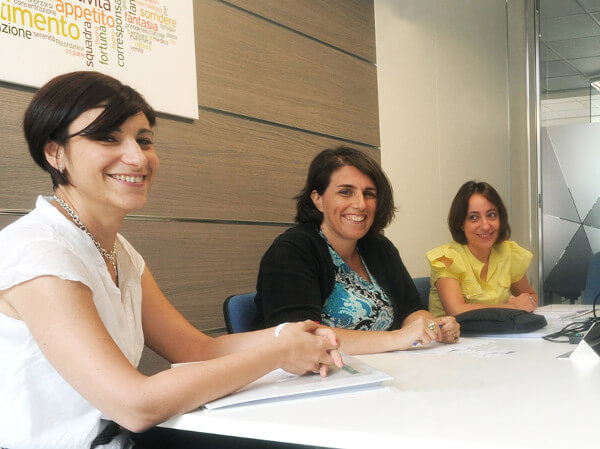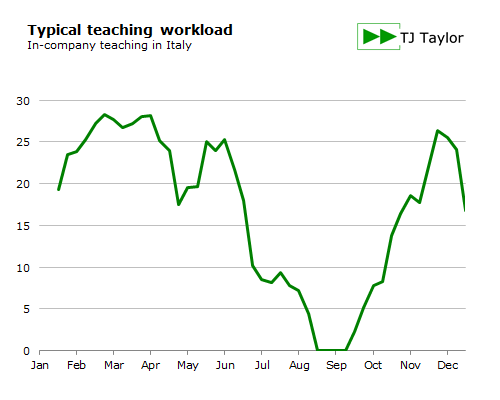Unfortunately there are many ‘cowboy’ schools in Italy, especially in the larger cities or where the local language training market is dominated by a handful of large corporate clients.
However, there are also many schools and training companies that offer a supportive, professional working environment and a decent, if not excellent, salary.

All reputable English schools require a recognised TEFL certificate or similar, some teaching experience, and at least one reference, although some of the larger chains and method schools are more flexible.
Although there’s no state regulation of private language schools, it’s normally a positive sign if the school is a member of Federlingue, AISLi, EAQuaLS or IATEFL, which are industry associations that aim to raise standards in the sector. Many schools run courses with public funds or grants, and this normally requires accreditation from their local Regione (similar to a county) or ISO 9001 certification, which are useful indicators of professionalism.
The 4 Types of School
Sometimes it might seem that all schools are the same, but in reality there are 4 categories of school operating in Italy.
It’s important to understand these categories and the differences because they determine the pay and conditions, the type of teacher they’re looking for, your future prospects, and the priorities of the owners and managers.
The 4 types of school are:
- franchising & method schools
- independent schools
- agencies
- technology-based companies
Some examples:
| Independent schools | Agencies | Franchising & method schools | Technology-based |
|---|---|---|---|
Linguarama | Connor | Wall Street Institute | GoFluent |
Franchise or method schools are normally focussed on volume, and are typically best suited to newly-qualified teachers so they can follow the set method and get some teaching experience before moving on.
Agencies are focussed on cost and are driven by sales and margins. They normally look to hire freelancers and for a specific course or duration, based on the number of courses they are expecting.
Technology-based companies are online platforms that add teachers to an elearning system for online lessons, telephone lessons or student support. They hire in various time zones and at various levels of experience.
Independent schools usually focus on quality and personalisation, so they have to hire more experienced teachers. To attract these, they normally offer better pay and conditions than franchise or agency schools.
Questions to Ask at Interview
Now that you’ve chosen which schools to apply to, let’s move on to the job interview. If you ask the following 6 questions during an interview, the answers will give you a good guide to the level of professionalism at the school:
1. What is your rate of staff turnover?
It’s not uncommon for some schools in Italy to have a turnover rate in excess of 100%. Many schools hire teachers for 9 or 10 months and then rely on fresh faces for the next academic year after the summer holidays, rather than build up and develop a long-term body of professional, committed teachers.
“It’s not uncommon for some schools in Italy to have a turnover rate in excess of 100%.”
2. What kind of clients do you have?
The purpose of this question is to understand not the size of the clients or how famous they are, but if the school is overly dependent on 1 large client. The most common reason for the failure of an English school, or volatile working conditions for the teachers, is that the school depends on or is financially captive to one large corporate client.

Although this can be convenient for teachers as much of their work is at or around one site, this often means that pay and conditions are worse than average, and the focus is on quantity over quality due to the inevitably low margins.
3. What is the average age of your teachers?
This is possibly the most reliable indicator of how professional a school is. Related to the first question, many less reputable schools rely on au pairs, gap-year students, and enthusiastic new graduates from TEFL course providers that promise guaranteed placement – though more common in China, South Korea and Thailand, these schools rely on a ready supply of naive and usually younger teachers.
“the average age of their teachers is possibly the most reliable indicator of a professional school”
4. (For corporate courses) do the students have a different teacher every lesson?
This can be sign of high teacher turnover or unstable schedules. It’s common in-school, especially if there’s an open booking system, but it’s rare in corporate courses and so can be a warning sign.
This ‘system’ is used to mask the large number of teachers leaving the school, or to prevent teachers from developing a rapport and poaching students. In either case it means a lot of flux and instability in your schedule from week to week, and restricts the pleasure that every teacher takes in seeing a student progress.
5. Does the contract cover the August holidays, and what provisions are there if I am sick?

With the exception of children’s summer camps, most work comes to a complete stop in August, and is often very limited in July and December, even in large cities.
A good salary over the academic or calendar year is important, but your rent will also need to be paid in August and September. If the school offers a contract only up to May or June then it expects the teacher to move on for the next year.
“most teaching work comes to a complete stop in August, even in large cities.”
6. Do you require an Italian work permit and a contract?
If the answer is not a resounding yes, you don’t need to waste time continuing the interview. Many teachers from outside the EU have difficulties with the infamous Italian bureaucracy, but without legal work and residence papers, you risk being taken advantage of by unscrupulous schools with low pay and bad working conditions. Being an illegal immigrant will also make life more difficult, such as renting accommodation, access to health care, opening a bank account, etc.
How to Avoid Scams

A simple way to verify if a school is legitimate is to check that it’s listed in the yellow pages (called Pagine Gialle in Italian). It’s also a good idea to do a search to make sure the telephone number hasn’t been used before under a different name, and it’s worth noting if the operation is using a mobile phone number rather than a landline – mobile numbers in Italy always start with a 3 and landlines with 0.
“Verify a school is legitimate by checking that it’s listed in the Italian yellow pages.”
You should never be asked to make a deposit to process your application, book a flight, or as security for accommodation – this is one of the most common scams.
Regarding accommodation, unfortunately some English schools in Italy have learnt from the scandal in Japan and have found that they can charge their teachers much more for accommodation in the school’s apartments, or those of an ‘absent landlord/relative’, than they can charge on the open market.
Most schools do, however, try to look after their teachers and help with the task of finding accommodation – just make sure your job is not conditional on you having to stay in ‘their’ accommodation.
If you are not an EU citizen, applying for a good job is more difficult as you will also require valid working papers in order to avoid working on the black market. Any reputable school will explain the work visa application procedure, which must be started BEFORE you arrive in Italy (see FAQ on work visas and permits for more details).
Learn more:
- Qualifications and TEFL Certificates
- How and Where to Find a Teaching Job
- Independent or Freelance Teacher?
- Understanding Visas and Permits
- How to Calculate your Net Salary
- Guide to Employment Contracts
- Payslips and Common Italian Terms
- Return to main FAQs page
Are you interested in teaching English with us in Italy?
